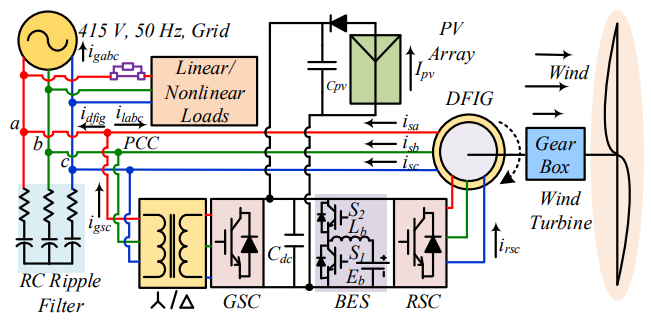Operation of Grid Connected PV-Battery-Wind Driven DFIG Based System
Also Available Domains AC Drives|Hybrid Systems|Power Quality|Wind Power Generation
Objective
The main objective of this project to improve the operation and power quality of Grid Connected PV-Battery-Wind Driven DFIG Based System under different abnormal conditions.
Abstract
This paper presents a PV-battery and wind driven doubly fed induction generator (DFIG) based grid connected system with an improved multi-functional control scheme for grid-side converter (GSC). A three-stage improved reduced-order multiple integrator (ROMI) control is used to maintain the reactive power into the grid as well as it regulates the DC-link voltage across the GSC. The grid side control improves power quality in different abnormal conditions. Moreover, it behaves such a way that it reduces the rise time, the maximum peak over-shoot as well as the settling time during the transients. The rotor side converter (RSC) is used to provide the required amount of reactive power using the field-oriented control, for the wind power generator (WPG). A DFIG is used as a WPG. The single-stage PV array and a battery with bi-directional converter are connected to the common DC-link of the GSC. The battery helps to extract the maximum wind power in light load conditions.
Index Terms— DFIG, Solar PV Generation, battery, power quality, MPPT, ROMI
NOTE: Without the concern of our team, please don't submit to the college. This Abstract varies based on student requirements.
Block Diagram

Specifications
Software Configuration:
Operating System : Windows 7/8/10
Application Software : Matlab/Simulink
Hardware Configuration:
RAM : 8 GB
Processor : I3 / I5(Mostly prefer)
Learning Outcomes
- Introduction to Matlab/Simulink
- What is EISPACK & LINPACK
- How to start with MATLAB
- About Matlab language
- About tools & libraries
- Application of Matlab/Simulink
- About Matlab desktop
- Features of Matlab/Simulink
- Basics on Matlab/Simulink
- Introduction to controllers.
- Study of PWM techniques.
- Project Development Skills:
- Problem analyzing skills
- Problem solving skills
- Creativity and imaginary skills
- Programming skills
- Deployment
- Testing skills
- Debugging skills
- Project presentation skills
- Thesis writing skills


 Paper Publishing
Paper Publishing
